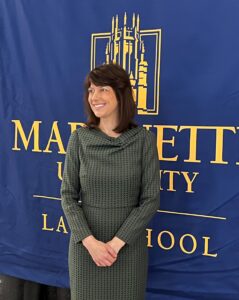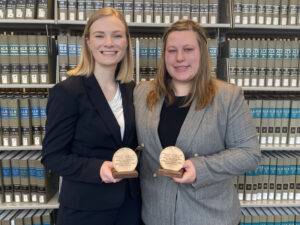Congratulations to AWL Scholarship Winners Bondar, Filali, and Gross
On Wednesday, September 7, the Milwaukee Association for Women Lawyers (AWL) Foundation honored three Marquette University Law School students with scholarships.

Sarah Bondar, 2L, received the AWL Foundation scholarship. The AWL Foundation Scholarship is awarded to a woman who has exhibited service to others, diversity, compelling financial need, academic achievement, unique life experiences (such as overcoming obstacles to attend or continue law school), and advancement of women in the profession.
Bondar is a Wisconsin native and former law enforcement officer and 911 dispatcher. She wanted to attend law school to pursue her original dream of becoming a lawyer and helping victims of domestic violence. In addition to attending classes, working as a law clerk, and owning her own life coaching and event planning business, Bondar is actively involved in several student organizations. She’s the president of the Children and Family Law Association, president of the Alternative Dispute Resolution Society, director of communications for the Federal Practice Society, and Student Liaison for the State Bar of Wisconsin ADR Section. Bondar also volunteers with the Marquette Volunteer Legal Clinic as a Student Board Advisor. After she graduates, Bondar plans to practice for a few years, then open her own firm, focused primarily on family law.

Noelle-Nadia Filali, 3L, was awarded the Virginia A. Pomeroy scholarship. This scholarship honors the late Virginia A. Pomeroy, a former deputy state public defender and a past president of AWL. In addition to meeting the same criteria as for the AWL Foundation scholarship, the winner of this scholarship must also exhibit what the AWL Foundation calls “a special emphasis, through experience, employment, class work or clinical programs” in one of several particular areas: appellate practice, civil rights law, public interest law, public policy, public service, or service to the vulnerable or disadvantaged.


